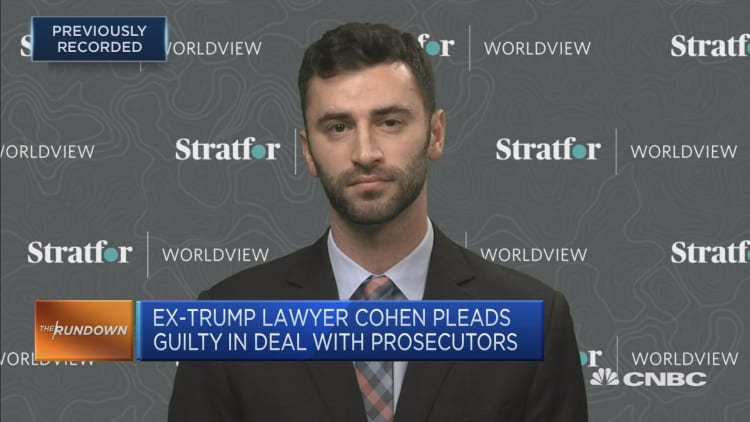
Pressure is building on U.S. President Donald Trump to take tougher actions against Russia, an expert said on Wednesday after the U.S. Treasury announced a series of new sanctions on Moscow.
Calls for more potent measures to punish Russia are coming from both within and outside the U.S.
Russia, under President Vladimir Putin, has been accused of undermining democracies and violating international rules with activities including tampering with the U.S. election and poisoning a former Russian spy in the U.K.
"There're a lot of things going on right now that are calling for (an) increase in sanctions against Russia," Eugene Chausovsky, senior Eurasia analyst at consulting firm Stratfor, told CNBC's "The Rundown" on Wednesday.
Domestically, criminal charges against two of Trump's former aides — campaign manager Paul Manafort and long-time lawyer Michael Cohen — could strengthen the case for Justice Department special counsel Robert Mueller's probe to continue, Chausovsky said. Mueller is investigating possible Russian interference in the 2016 U.S. presidential election. Manafort's trial was a major victory for Mueller's probe, and Cohen came under investigation by federal prosecutors in New York City after a referral by the special counsel's team.
Several members in Congress have also questioned whether the Trump administration has gone far enough to rein in the Kremlin's behavior, The Wall Street Journal reported.
Internationally, U.K. Foreign Secretary Jeremy Hunt on Tuesday urged the European Union to "stand shoulder to shoulder" with the U.S. in sanctioning Russia.
The U.S. Treasury on Tuesday said it blacklisted two Russian companies and six vessels for violating United Nations sanctions on North Korea. In addition, two other firms — one Russian and one Slovakian — along with two Russian individuals were called out for helping another company avoid U.S. sanctions.
Those latest actions by the U.S. are "mild," said Chausovsky, because they target specific companies and individuals for "very specific issues." But tougher sanctions against an entire industry in Russia or very large Russian companies could come in the next few months, he added.
Russia's economy hit
Geopolitical concerns, along with volatile oil prices, have affected investment flows into Russia's energy-dependent economy. Foreign direct investment into Russia fell to just $11.86 million in 2015 before recovering to $26.08 million last year, according to data by the Organisation for Economic Co-operation and Development.
Russia's currency has also been hit. The ruble was at its weakest ever against the U.S. dollar in 2016. This year, the currency has also been depreciating: A dollar bought around 64.4098 rubles on Wednesday, compared to 57.6575 rubles at the start of 2018.
The weakening ruble is becoming a pain point for the Russian government, which is feeling the resentment from its people, said Otilia Dhand, a senior vice president specializing in part in Russia at consultancy Teneo Intelligence.
Such domestic pressure may lead Moscow to improve ties with the U.S. on the hope of avoiding further isolation on the international stage, Dhand told CNBC's "Capital Connection" on Wednesday.
"On the Russian side, they will tread carefully because they do see an opportunity to improve relations, which is something that they will gradually need more and more, and normalize the situation, get out of at least partial isolation in international relation and then try not to do anything that would cause deterioration in their relationship with the U.S.," she added.
On the U.S. side of the equation, she said, Congress has tougher sanctions on Russia standing at the ready.


